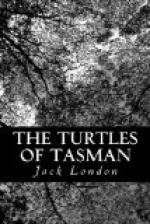He shook the hysteria from him. He drew his hunting knife and worked as rapidly as his injured thumb and weakness would permit him. He did not stop to skin the moose, but quartered it with its hide on. It was a Klondike of meat.
When he had finished he selected a piece of meat weighing a hundred pounds, and started to drag it down to the tent. But the snow was soft, and it was too much for him. He exchanged it for a twenty-pound piece, and, with many pauses to rest, succeeded in getting it to the tent. He fried some of the meat, but ate sparingly. Then, and automatically, he went out to his crouching place on the bank. There were sled-tracks in the fresh snow on the trail. The sled-load of life had passed by while he had been cutting up the moose.
But he did not mind. He was glad that the sled had not passed before the coming of the moose. The moose had changed his plans. Its meat was worth fifty cents a pound, and he was but little more than three miles from Minto. He need no longer wait for the sled-load of life. The moose was the sled-load of life. He would sell it. He would buy a couple of dogs at Minto, some food and some tobacco, and the dogs would haul him south along the trail to the sea, the sun, and civilisation.
He felt hungry. The dull, monotonous ache of hunger had now become a sharp and insistent pang. He hobbled back to the tent and fried a slice of meat. After that he smoked two whole pipefuls of dried tea leaves. Then he fried another slice of moose. He was aware of an unwonted glow of strength, and went out and chopped some firewood. He followed that up with a slice of meat. Teased on by the food, his hunger grew into an inflammation. It became imperative every little while to fry a slice of meat. He tried smaller slices and found himself frying oftener.
In the middle of the day he thought of the wild animals that might eat his meat, and he climbed the hill, carrying along his axe, the haul rope, and a sled lashing. In his weak state the making of the cache and storing of the meat was an all-afternoon task. He cut young saplings, trimmed them, and tied them together into a tall scaffold. It was not so strong a cache as he would have desired to make, but he had done his best. To hoist the meat to the top was heart-breaking. The larger pieces defied him until he passed the rope over a limb above, and, with one end fast to a piece of meat, put all his weight on the other end.
Once in the tent, he proceeded to indulge in a prolonged and solitary orgy. He did not need friends. His stomach and he were company. Slice after slice and many slices of meat he fried and ate. He ate pounds of the meat. He brewed real tea, and brewed it strong. He brewed the last he had. It did not matter. On the morrow he would be buying tea in Minto. When it seemed he could eat no more, he smoked. He smoked all his stock of dried tea leaves. What of it? On the morrow he would be smoking tobacco. He knocked out his pipe, fried a final slice, and went to bed. He had eaten so much he seemed bursting, yet he got out of his blankets and had just one more mouthful of meat.




